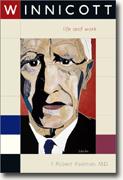Winnicott
F. Robert Rodman
book reviews:
· general fiction
· chick lit/romance
· sci-fi/fantasy
· graphic novels
· nonfiction
· audio books
· author interviews
· children's books @
curledupkids.com
· DVD reviews @
curledupdvd.com
newsletter
win books
buy online
links
home
for authors
& publishers
for reviewers

 |
Winnicott: Life and Work F. Robert Rodman Perseus Hardcover 464 pages April 2003 |
|
Winnicott: Life and Work is full of detail, as would a book be written so relatively soon after the death, in 1971, of someone whose life revolved around correspondence and note-keeping. Yet it manages not to be especially personal. Written for the cognoscenti, it only alludes through reference to what, to a layman reader, feel like the most alluring clues to the man Winnicott. Much more concerned with the intricacies of relationship and rivalry among Winnicott and his many famous mentors, notably Melanie Klein and Anna Freud, it rushes past Winnicott's direct work with children, his expressed opinion that "children would have been better off bombed than evacuated" and the suicides of many of his patients, which seemed not to have bothered him especially, though one at least may have led to a coronary and to the frequent attacks of angina with which he was plagued in later life. We do learn that Winnicott conducted an affair with one of his colleagues, Clare Britton, whom he eventually married after honorably divorcing his somewhat dotty first wife and that he was likely impotent and possibly mildly homosexual. His first analyst was James Strachey, one of the Bloomsbury group and a homosexual, and it is obvious that an analyst and his analysis become deeply linked. In fact much of analysis is concerned with analysis - how to extract its essence and then devolve and extricate oneself from its processes. Therefore a lot of the book is taken up with Winnicott's theories about these processes, and the thoughts of this big man are perhaps too convoluted for the ordinary reader. "Near the end of his life Winnicott wrote: 'I have this need to talk as though no-one had ever examined the subject before, and of course this may make my words ridiculous.'" Ridiculous they rarely were, but often terribly hard to follow. He was enmeshed in a culture - second generation Freudian analysis - that by its nature was infinitely self-examining and self critical. Surrounded by people who, like himself, sucked meaning out of every miniscule event of life and were ever on the lookout for the weaknesses of colleagues, it was only natural that Winnicott would become ingrown and petulant. But his creativity never waned, and towards the end he made a note to himself: "Prayer: Oh God, may I be alive when I die." Author F. Robert Rodman asserts that "whereas Freud viewed man as bestial and in need of training, Winnicott had faith that in the natural course of events...the individual becomes a moral being." In fact, Winnicott warned that "we are poor indeed if we are only sane." It was this creative approach to the mysteries of the psyche that attracts followers to Winnicott in preference to some of his better known peers in the psychoanalytic realm. If one wanted a map into this attraction, it could perhaps be found in this excerpt from his writing, regarding his own work: "The test of these case descriptions will hang on the word enjoyment. If they are a labor to read then I have been too clever; I have been engaging in displaying a technique and not playing music."
|
|
|
|
 Click here to learn more about this month's sponsor! |
|
| fiction · sf/f · comic books · nonfiction · audio newsletter · free book contest · buy books online review index · links · · authors & publishers reviewers |
|
| site by ELBO Computing Resources, Inc. | |
 The author of this considerable work is also a psychoanalyst, and perhaps
only another psychoanalyst would be qualified to write abut Winnicott. To
outward appearances a rather bluff and cheery upper-class Englishman, Winnicott
was clearly brilliant and by all accounts charismatic as well as personable.
During the second world war, in his position as a pediatrician at the
Paddington Green Children's Hospital, he used his qualifications as an
analyst to work intensively with children who had been evacuated from London
during the Blitz. He gained insights into the relationship between mother
and child and developed an important set of theories regarding "transitional
objects" with which a child gradually effects the separation from its mother
- even he was able in later years to make reference to the transitional object
as a "Linus blanket."
The author of this considerable work is also a psychoanalyst, and perhaps
only another psychoanalyst would be qualified to write abut Winnicott. To
outward appearances a rather bluff and cheery upper-class Englishman, Winnicott
was clearly brilliant and by all accounts charismatic as well as personable.
During the second world war, in his position as a pediatrician at the
Paddington Green Children's Hospital, he used his qualifications as an
analyst to work intensively with children who had been evacuated from London
during the Blitz. He gained insights into the relationship between mother
and child and developed an important set of theories regarding "transitional
objects" with which a child gradually effects the separation from its mother
- even he was able in later years to make reference to the transitional object
as a "Linus blanket."